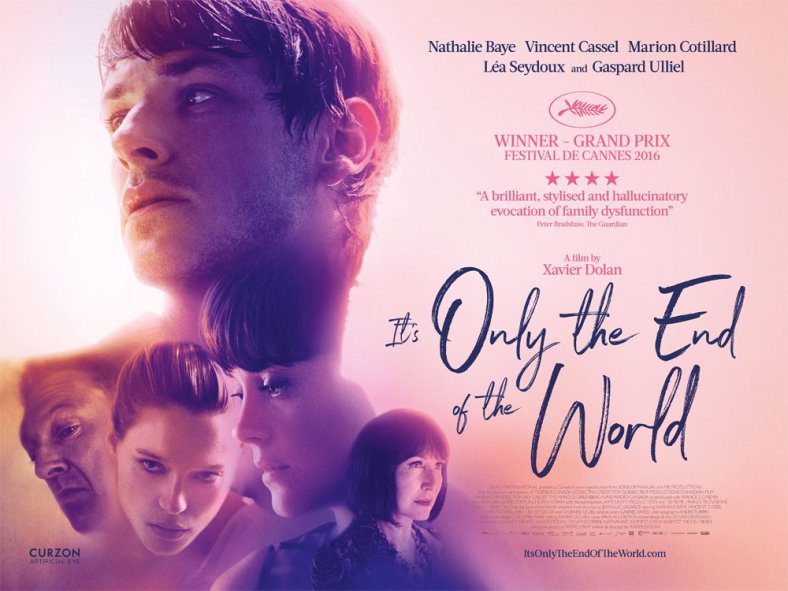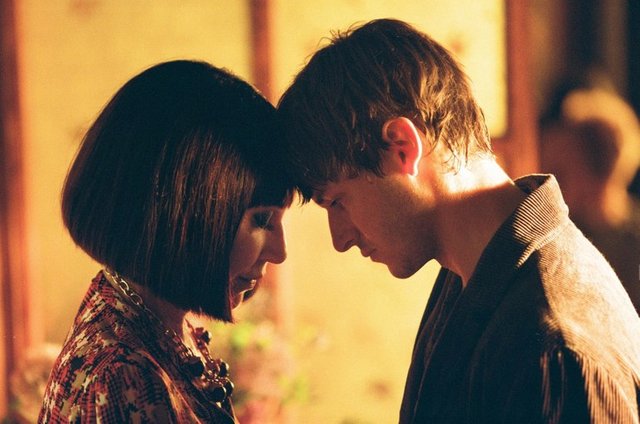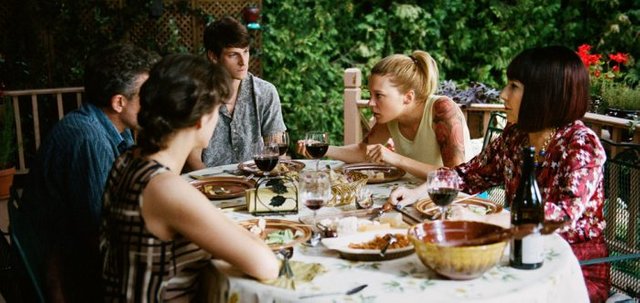It's only the end of the world - movie review
The new film of Xavier Dolan - “It's only the end of the world”, has provoked controversial reactions by the audience and criticism.
The audience of the Film Festival in Cannes is known for not surpassing the loud expression of their impressions of a movie - almost every year we hear a movie being greeted with ovations, while another is horrifyingly denounced. Often it happens that a bunch of critics simply abandon the screening, and some films allegedly caused mass unconsciousnes. Last year there was no fuss, but one movie was fiercely denounced. It was “It's only the end of the world”- the new achievement of the young and the favorite of critic - Xavier Dolan. It is interesting that the same film at the same festival received the so-called Grand Prix, or the second prize. Apparently, the jury did not denounce it. It is even more interesting that the anglophone critics were mainly denouncing it, while the French were praising it. What is it about this film, that divides so much criticis and does it really credibly and strikingly depicts complicated family relationships or gets stuck in a bad scenario, which is most often offended by it?

The Average family: guilt, expectation and disappointment
“It's only the end of the world” is after “Tom at the farm” second Dolan's film based on the drama text. As it usually happens with this director, the theme of homosexuality is one of the basics in both films. But, while “Tom at the farm” was a psychological thriller, cracked with the outcast games, “It's only the end of the world”, at least seemingly, is a lot more pitiful: the whole action of the film is goes for one day in the house (and around the house) of a family. Namely, the middle son of Lewis (Gaspar Uliel), a successful writer, returns home after 12 years to announce to his closest (mother, brother, brother's wife, and sister) that he is sick and dies. We find about this at the very beginning of the film, and then we spend the rest of the time watching the quarrels of his dysfunctional family and waiting for him to publish his sad news. The problem is that nobody is willing to listen, and the most important thing to everyone is what they have to say. Lewis's mother, Martin (Natalie Bai), dressed as a drag queen "because he is gay," at the beginning of the visit says "there is no need for tears and announcements today," but then she takes his son into a separate room and explains it through a dramatic monologue how he must talk to everyone and give them some kind of hope.
Almost all the interactions that Louis has with his family are monologues followed by his smiley expresions. It is clear that for 12 years many left unspoken and that the postcards he sends regularly are not enough signs of attention and love. Promises about future views are expected from this lunch, and not the announcement of an end. The most offended by brother's departure is likely Lewis's sister, Susan (Leah Seydou), who in his interrupted monologue asks why Lewis came and says that the time she could spend with him was a waste of time. Unlike the mother and sister who express their emotions through long speeches, Lewis’s brother Antoine (Vensan Cassel) barely speaks, and when this happens he shouts and, unlike other family members, reacts impulsively and utterly out of the question. The only person who might be willing to listen to Lewis is Antoine's wife, Katrin (Marion Kotijar), who sees him for the first time, but at one point she clearly says that there is no place for her in deep family conversations, and that all disagreements of the brothers should be resolves among themselves. She is also slightly shallow, so she calls homosexuals "you people" and thinks they can not have children, but she is charming, or at least that is what they all claim. A large part of the film was hard to listen to in its rolled and helpless manner.

The truth is somewhere in orange
It is clear that Martin's wishes for a peaceful family lunch in such a family can not come true, but also that she does not work according to these wishes. It's hard to see five people constantly fighting or, to put it better, looking at four people who blame one for everyone who has not even been in their life for more than a decade. Nevertheless, Dolan manages to keep the attention of the viewers by removing the big screens of the actors' faces one after the other, and in a timely manner focusing all the attention on Lew's inner world: on several occasions we see him reviewing his memories, and the most impressionable is a flashack of his childhood and sex with his boyfriend for whom he later finds out that he died. Because of these big frames, it seems that we are too close to the face of a great acting cast, but it only contributes to the feeling of claustrophobia that Dolan undoubtedly wants to challenge. The music used by the director is also aggressive as it forces us to listen to it - it overwhelms the characters with an unbearably intensified pop song that lasts longer than usual. Even moments of silence are striking and she is sometimes deafening.

It is indisputable that Dolan, with his 27 years of age, is a skillful director and that he knew what he was doing when he started adapting this drama, but there are scenes when the text seems to be intended to perform in front of a theater audience. This does not necessarily has to be bad, especially if one considers that this film is a big emotion, and long, emotional, monolgues can be justified. Dolan even found a way to, at the very end of the film, make the whole scene green with the camera, always close to the face of the protagonist, and this seems to be a natural ending of a strenuous 95 minutes of family battles and overcoming all the problems of the past. It often happens that any attempts of catharsis, both the audience and the characters themselves, in modern performances, act in a dashing, reluctant and pretentious manner. In the movie, this last orange scene is cataract for Louis. He finally understands what to do and leave the parental home with a smile on his face, and the audience does not remain deprived of the possibility of some deeper insights. However, this ending is set so that the viewer does not seem to be under the influence of some great and exalted feelings or purification.
Where is the truth from the beginning and who is right or wrong, the praising French or denouncing Americans and Englishmen. OF course you need to decide on your own after watching, but if you like to watch movies in which people come up to one’s face and do not solve a single conflict of their, and in which there are many feelings, and not so many events, this is a movie for you. It is also necessary to love and to fight a bit, but as the film takes only 95 minutes, which today is praise in itself, the dysfunctional family is much more tolerant than we used to.

Hi my name is Jerome. I am giving away 1.500 SBD for signing up to this ICO
After you have completed you will receive your reward